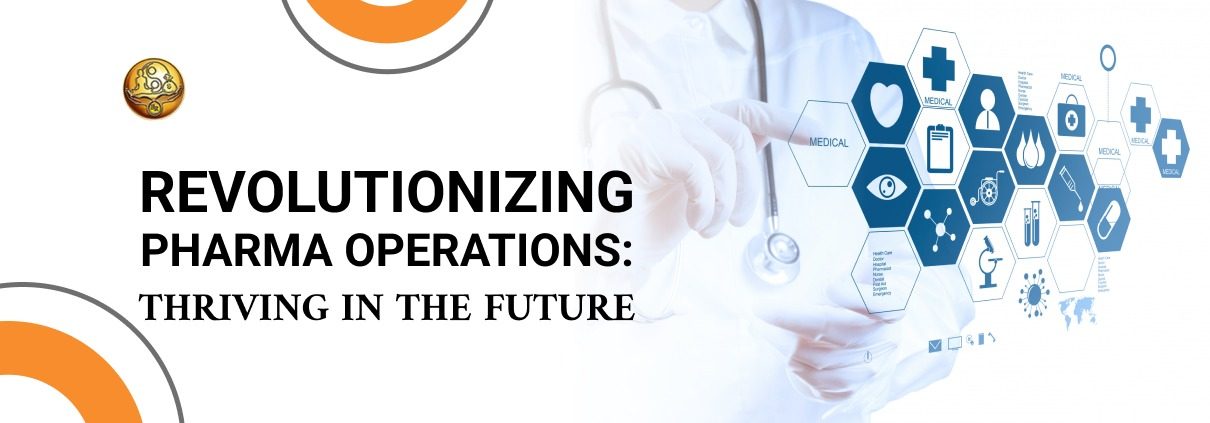In the past, pharmaceutical companies didn’t give much attention to their operations. But now, things are changing! With the COVID-19 pandemic, inflation, geopolitics, and work methods, it’s time for them to carefully rethink. They need to re-strategize their sourcing, manufacturing, and supply chain decisions.
This is the perfect moment to focus on operations strategy, especially after two intense years. Succeeding in pharma means excelling in operations under these challenging conditions.
Instead of just continuous improvement, operational leaders should now address long-term external challenges. It includes problems like high inflation and increasing complexity and risk. These factors can have interconnected effects.
By shifting focus, pharma operations leaders can bring more value to their organizations. But they need to act fast to tackle industry challenges.
In this article, we’ll explore the challenges that pharma leaders face. Also the steps they can take to develop a more strategic, long-term approach to operations.
Pharma Industry’s External Challenges
The pharma industry is currently facing a lot of challenges from external factors. The demand for medications all over the world is going up, especially with the urgent need for COVID-19 vaccines and treatments. It’s pretty impressive how they managed to respond and provide vaccines, but dealing with this increasing global demand is a big long-term challenge.
On top of that, the product landscape is changing day-by-day. New approaches like cell and gene therapy and mRNA vaccines are becoming more important in drug development. This means they have to deal with new technologies, supply chains, and product life cycles.
This is causing increased costs for labor, raw materials, and transportation, which is putting a strain on their profit margins. And to make matters worse, state interventions like protectionist trade policies are also adding pressure on manufacturing networks. It’s definitely a tough situation they’re facing!
Source – Mc&Kinsey Company
Changing Landscape for Pharma Operations
Pharma companies face six major implications in the future:
- Rising operational complexity
- Increasing risks (ESG expectations and skills gaps)
- Shift in capability requirements (new modalities and digital acceleration)
- Higher capital expenditure needs (new sites and digital infrastructure)
- Variable-cost increases (raw materials, transportation, attrition, and salaries)
- Opportunities for savings (ESG commitments and digital implementation)
Strategic Domains to Accelerate and Scale Pharma Operations:
When it comes to transforming the pharma industry, there are 4 strategic domains to focus on.
a. Network and resilience
b. Digital strategy
c. Operating model and ecosystem
d. Talent strategy.
1. Building Resilient Supply Chains: Plan for the Future
Recent supply chain disruptions have taught us the importance of resilience. Instead of just reacting with short-term solutions like building inventory, pharmacos can make a real impact by considering long-term actions, like network design and dual sourcing.
2. Embracing Digital Transformation: Scaling for Success ‘
Digital solutions have proven their worth in pharma operations, but scaling them is the challenge. Although it requires substantial investment, the payoff is enormous. It includes cost savings, improved quality, and increased resilience.
The move towards network-wide and end-to-end digitization is already underway. As many companies are recognizing for their advanced use of digital technologies.
3. Collaborating for Greater Success: End-to-End Partner Ecosystems
Shifting from traditional hub models to strategic partnerships can yield significant benefits. More and more companies are intensifying collaborations with other industry players, creating ecosystems to foster innovation. Pfizer and BioNTech, AstraZeneca and Huma, are examples of successful partnerships.
4. Strategic Workforce Planning: Unlocking Talent Potential
The shortage of talent in the pharma industry calls for new approaches. By focusing on reskilling, upskilling, and automation, companies can tackle talent gaps and retain valuable employees.
5. Beyond Attractive Salaries: Long-Term Talent Solutions
Increasing wages may not be enough to solve talent shortages. Companies must invest in long-term reskilling and upskilling programs. Innovative strategies like Roche’s operations rotational program and Novartis’s “choice with responsibility” policy can improve overall employee experiences.
Let’s discuss some of the top trends that are shaping future of Pharma Industry:
1. Patients as Advisors:
Let’s put patients in charge! Digital health is empowering people to take control of their well-being. So why not involve them in shaping the future of healthcare? Pharma companies should create advisory boards with real patients, giving them a voice in decision-making. Knowing their exact needs will lead to innovative products and a future-proof healthcare system.
2. Digital Health Beyond Pills:
Pharma’s not just about pills anymore! Embrace technology to build patient-support programs. These solutions go beyond drugs and can improve patient outcomes. Take the example of mySugr, a diabetes management app that turned health into a game. Patients loved it, and Roche saw the potential, acquiring the startup to continue its growth.
3. Digital Pills for Better Adherence:
Ever heard of digital pills? These little wonders have embedded circuits, helping patients stick to their medication schedules. The pill sends Bluetooth signals to an app, ensuring doctors and caregivers know when it’s taken. It’s a game-changer, especially for those dealing with severe conditions like schizophrenia.
4. In Silico Trials:
Say goodbye to old-fashioned animal testing! In silico trials use computer simulations, saving time and costs while avoiding harm to animals and humans. These virtual trials can replicate human research effectively, and with COVID-19 pushing us forward, they’re gaining more acceptance.
5. VR Therapy for Pain Relief:
Virtual Reality isn’t just for gaming; it’s making waves in healthcare too! Hospitals are using VR to help patients manage chronic pain and reduce stress. Instead of relying solely on painkillers, pharma companies should explore the potential of VR therapy. Soon, you might even see VR pharmacies with specialists prescribing personalized VR treatments!
6. Precision Medicine: Personalized Meds Based on Genes and Lifestyle:
Have you heard of precision medicine? It’s the new big thing in healthcare!
Picture this: doctors treating diseases based on your unique genes, lifestyle, and environment. No one-size-fits-all approach anymore! In the pharma world, this means something called pharmacogenomics. It’s all about studying how your genes influence how drugs work in your body. Turns out, not all meds are equal for everyone!
Take cancer, for example:
Scientists are developing drugs that go straight to those nasty cancer cells, leaving healthy ones unharmed. Awesome, right? Also, they want to make targeted therapies just for you! To get this right, some experts suggest a genetic test before prescribing certain meds, like Warfarin.
7. 3D-Printed Meds: The Future of Pharmacy
The Future of Pharmacy Hold on tight! We’re entering the era of 3D-printed drugs. Researchers are busy printing tiny organs and even custom heart tissues. It’s like sci-fi coming to life in a hospital!
UK’s FabRx predicts that within 5-10 years, we’ll have printed tablets in our local pharmacies. Imagine that! But wait, it gets crazier. Maybe one day, we’ll all have 3D printers at home, spitting out meds whenever we need them. Who needs a pharmacy down the street then?
8. AI in Pharma: Revolutionizing Drug Discovery and Treatment Plans
The Doctor’s Super Assistant Artificial Intelligence is here to revolutionize healthcare, and it’s starting with the pharma industry. Brace yourself – AI can dig through mountains of medical data, design treatment plans, and even cook up new drugs! No kidding, it’s making drug discovery faster and cheaper.
You won’t believe this – it takes an average of 12 years and $2.9 billion to launch a drug! But with AI, we’re talking about slashing those numbers big time! It’s like having a genius assistant who can accelerate progress in healthcare.
9. Pharma Regulations: Need for an Upgrade to Embrace Innovations
Picture this: regulations that govern drug production and digital health gadgets are stuck in the past. Time for an upgrade, don’t you think? With so many cool innovations popping up, old rules just can’t keep up.
Take the #wearenotwaiting movement, for example. Diabetic patients started using artificial pancreas devices without waiting for the FDA’s green light. They needed it, and they knew it worked! But hey, regulators gotta catch up to avoid dangerous DIY solutions.
Even those cool genetic testing kits faced a tough time. The FDA put the brakes on 23andme’s health info services, saying it was confusing. But now they’re back in action, revealing your susceptibility to certain diseases.
10. Augmented Reality: Enhancing Medication Understanding and Experience
With AR, you can see how your meds work in 3D, right in front of your eyes. No more deciphering long, confusing descriptions. It’s like magic! Nurses already use AR to find veins easier, and now it’s making its way to pharma. Get ready to see your meds like never before.
Conclusion:
In conclusion, the pharma industry has done an incredible job delivering COVID-19 vaccines and meeting demands, but there are challenges ahead. Rising costs, complexity, and risks are putting companies to the test. It’s crucial for companies to rethink their operational strategies and stay competitive. This will need strong and innovative leadership, but if they embrace change and implement new strategies, they can seize the opportunities in this rapidly growing industry. Now is the time to take action and thrive in the future of pharma!





Leave a Reply
Want to join the discussion?Feel free to contribute!